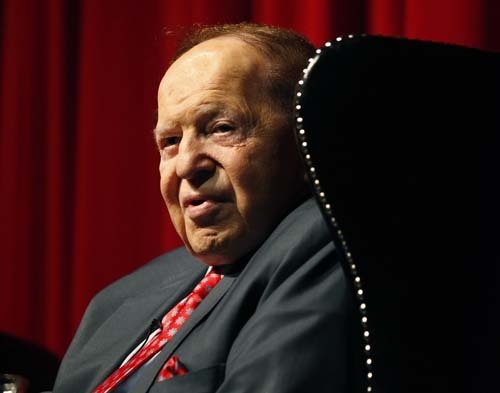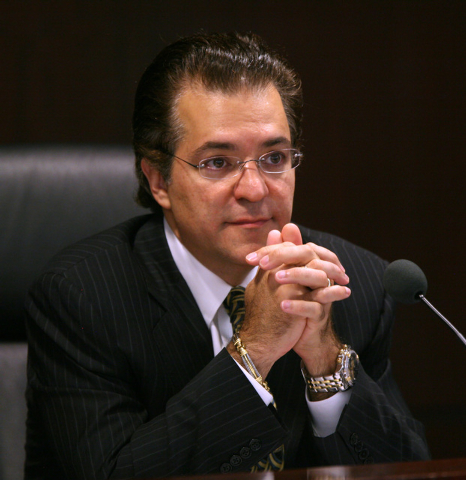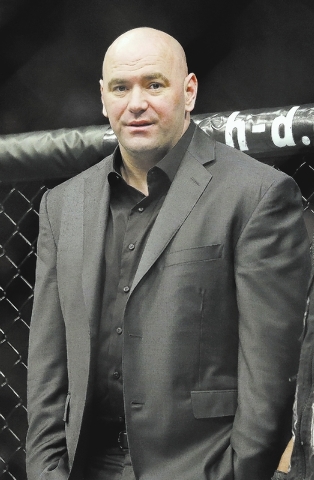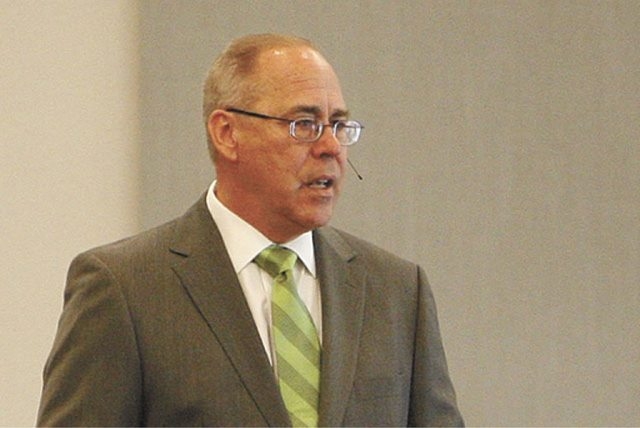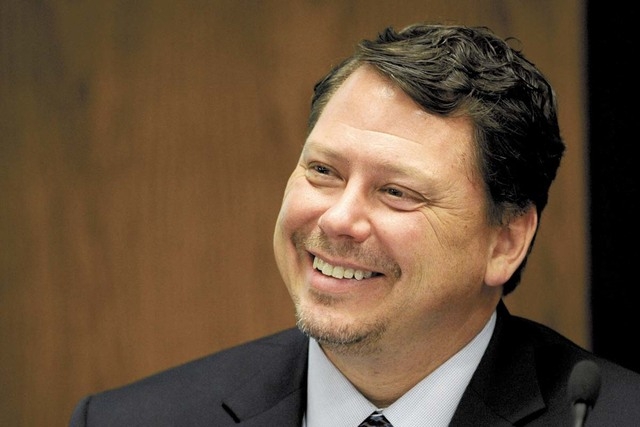WHO’S GOT CLOUT? The Business Press presents the power brokers of Las Vegas
It’s become a poignant and patriotic moment on the Strip.
Roughly 100 or so “wounded warriors” — soldiers who suffered catastrophic injuries while serving in Iraq and Afghanistan — are annually welcomed with their families for an all-expenses-paid weekend in Las Vegas at The Venetian.
Employees of the property line the lobby to cheer on and welcome the guests.
At the front of the greeting line for the “Salute Our Troops” is Las Vegas Sands Corp. Chairman Sheldon Adelson.
Along with his wife, Dr. Miriam Adelson, the 80-year-old billionaire — now listed 12th on the Forbes 400 list with a net worth of $26.5 billion — welcomes each of the military veterans and their families.
Many of guests need prosthetic limbs or assistance to parade down the lobby. Adelson, slowed by the nerve condition peripheral neuropathy, uses a motorized scooter to move about.
The charitable gesture alone might be enough to land Adelson on the Las Vegas Business Press’ annual list of those with the most perceived clout in Southern Nevada.
But there is much more to Adelson than just his saluting war heroes.
Adelson has clout with a capital C.
ENTREPRENEURIAL EXCELLENCE
In profile stories and interviews, Adelson has discussed his rise from poverty. He grew up poor in the Boston area to become an entrepreneur and venture capitalist. Along the way, he created several multibillion-dollar businesses, including the Comdex computer trade show and Las Vegas Sands.
Penn State University assistant sociology professor Shannon Monnat became acquainted with Adelson’s influence while teaching for the past five years at the University of Nevada, Las Vegas. She said Adelson is one of a handful of “exceptionally capable and lucky individuals” to rise from poverty to extreme wealth.
“There is a lot of well-deserved pride and a sense of self-excellence that comes along with this ascension into the highest realm of social class rankings,” Monnat said.
Along the way, Adelson has become a contrast in actions.
He’s given away hundreds of millions of dollars to Israel and American Jewish interests, and to philanthropic efforts in the United States and Nevada.
At the same time, contractors that worked on The Venetian in the early 2000s had to sue to be paid.
Adelson and Las Vegas Sands are being sued for wrongful termination by the former CEO of the company’s Macau casino operations. Allegations in the lawsuit led to investigations of Las Vegas Sands by the U.S. Department of Justice and the Securities and Exchange Commission for potential violations of the Foreign Corrupt Practices Act.
And, for the second time, Adelson is appealing a Clark County jury’s verdict in a lawsuit involving a Hong Kong businessman who claims he was stiffed for work helping Las Vegas Sands earn a Macau gaming license more than 10 years ago. The current jury award stands at more than $100 million.
Several sociologists suggested that psychologists might have a better handle on Adelson.
“For him, it seems to be about maintaining power, making sure that everyone knows he’s boss and that he can make things happen when and how he wants,” Monnet said.
COUNTING THE SUCCESSES
There isn’t debate over Adelson’s clout in the gaming industry. He bought the Rat Pack-era Sands hotel-casino on the Strip in 1989 and demolished the casino in 1996 to make way for The Venetian.
For example:
■ Las Vegas Sands has invested billions of dollars to put Macau — the world’s most lucrative gaming market — on the map. The company owns four hotel-casino complexes and is building a $2.4 billion Paris-themed resort on the Cotai Strip.
■ Adelson is credited with developing the Meetings, Incentives, Conferences and Exhibitions business model that many gaming companies now use to fill hotel rooms during non-high-occupancy periods.
■ Adelson adamantly opposes the legalization of Internet gaming, breaking ranks with the bulk of the casino industry that wants to see the activity legalized nationally. In June, he penned an opinion piece for Forbes.com, planting himself firmly in the anti-Internet gaming corner. The commentary led to a somewhat meaningless boycott of The Venetian by Internet poker advocates.
Adelson’s self-confidence, Monnat said, can bring with it intolerance to opposing perspectives.
“Today’s modern CEOs, Adelson being one, often believe that their wealth is a reflection of or proof of their knowledge, hard work and excellence, and that those qualities then justify taking more wealth and having control over the country’s and the world’s economic and political outcomes,” Monnat said.
PAY TO PLAY
Nowhere has Adelson’s influence been felt more than in political circles.
During the 2012 election cycle, Adelson contributed more than $100 million to Republican candidates and the GOP’s unsuccessful effort to defeat President Barack Obama.
Adelson was the keynote guest at a fundraiser for failed GOP presidential nominee Mitt Romney in Israel. He gave $16.5 million alone to former house speaker Newt Gingrich’s short-lived presidential run.
The contributions placed Adelson on the national stage.
Even the president, in remarks at the annual White House Correspondents’ Association dinner in April, called out Adelson.
“Did you know that Sheldon Adelson spent $100 million of his own money last year on negative ads?” Obama said. “You’ve got to really dislike me to spend that kind of money. Sheldon would have been better off offering me $100 million to drop out of the race.”
Following the November election, the Republican Governors Association held its 2012 annual meeting at The Venetian. Prospective 2016 presidential candidates, such as Louisiana Gov. Bobby Jindel and New Jersey Gov. Chris Christie, sought audiences with Adelson.
Stanford University sociology professor Mark Granovetter, who specializes in economic sociology, said his knowledge of Adelson is limited to what he’s read and viewed in the media. Large political donations, he said, might earn clout in some situations.
“But even Mr. Adelson could not bring success to doomed candidates like Newt Gingrich, who never had a serious chance for the nomination,” Granovetter said. “This is a good illustration of the limits of contributions on political outcomes.”
Monnat said people she has spoken with in Pennsylvania were not familiar with Adelson, other than for the large donations in 2012.
“One has to wonder, did he spend all that money just to enhance his national and international profile?” Monnat said.
Despite the lack of success at the ballot box, Monnat said Adelson earned additional clout through the contributions.
“His donations were extremely influential in smaller political races,” Monnat said. “In addition, the reality is that the amount of money he spent was quite minimal relative to his net worth.”
Dr. Tony Alamo Jr., member, Nevada Gaming Commission
If anything, Dr. Tony Alamo Jr. has made the monthly Nevada Gaming Commission meetings less boring.
Alamo, who has been a member of the five-person commission since 2008, has sparked oftentimes heated discussions on gaming matters coming before the regulatory body. Most notable is Alamo’s opposition to taverns disguised as slot machine parlors.
Alamo, 49, believes debate is healthy.
“It’s important to have multiple opinions and a good discussion,” Alamo said. “This is a five-person commission. Not a one-person commission.”
Alamo was first appointed to the panel by then-Gov. Jim Gibbons. He was reappointed to a second four-year term in 2012 by Gov. Brian Sandoval. Only Gaming Commission Chairman Pete Bernhard has a longer-serving tenure on the commission.
Alamo grew up in the gaming industry. His father is retired gaming executive Tony Alamo, who served in high-level positions with several gaming companies. Tony Alamo Jr. is quick to point out that he never worked in the gaming industry, but learned the business from his father.
“I never collected a paycheck from gaming,” Alamo said. “But I remember all those years when my dad would come home, we would sit around the dinner and discuss all the events happening in the industry.”
Instead of gaming, Alamo earned his medical degree from the University of Southern California and has been a clinical physician in Nevada since 1994.
“I feel like I have come full circle because I have so much respect for this industry,” Alamo said.
Before joining the gaming commission, Alamo served eight years on the Nevada State Athletic Commission, where he also spent time as the panel’s chairman. Alamo also served as chairman of the Medical Advisory Board for the Athletic Commission in 2000.
— Howard Stutz
Tom Breitling, co-founder and chairman, Ultimate Gaming
Tom Breitling hopes to have the same impact on Internet gaming as he did for the way people book travel online.
He believes the activity can become just as seamless.
On April 30, Breitling oversaw the launch of Ultimate Poker, the first legal and regulated real money online gambling site in the U.S. The website, which is operated by Station Casinos-owned Ultimate Gaming, has dealt more than 14 million hands of poker through early September and has registered more than 30,000 users from all 50 states in the U.S. and 40 countries. To gamble on Ultimate Poker, a player must be physically in Nevada.
For now, it’s Nevada’s only legal online gaming site. Ultimate Gaming has a deal in place with the Trump Taj Mahal in Atlantic City to become part of New Jersey’s planned Internet gaming market.
“When history looks at my generation, the growth and expansion of the Internet will be central,” said Breitling, 44. “I think the power of the Internet is still untapped.”
In 1998, Breitling and business partner Tim Poster co-founded Travelscape.com. They capitalized on the growth of Las Vegas and of the Internet, propelling sales to $104 million in 1999. A year later, the partners oversaw the acquisition of Travelscape by Expedia Inc., in a deal valued at more than $100 million. Breitling was a member of the board of directors of Expedia in 2002 and 2003.
“We were filling everyone else’s hotel rooms. Our dream was to open our own property,” Breitling said.
In 2004, Breitling and Poster bought the Golden Nugget properties in Las Vegas and Laughlin for $215 million, becoming, at the time, the state’s youngest casino owners. Their ownership of the downtown Golden Nugget was the subject of a short-lived reality television series. They sold the casinos in 2005 for $340 million.
Breitling has poured that same fervor into Ultimate Gaming and legal online gambling. He oversaw the purchase of online gaming solutions provider developer CyberArts by Fertitta Interactive. The Oakland, Calif.-based company had a clean regulatory background, which Breitling believes helped Ultimate become first to market.
“You have to be comfortable operating in a strict regulatory environment, but that’s something we were able to address,” Breitling said.
Breitling believes Internet gaming’s growth beyond Nevada is inevitable. The example, he says, is how people live their everyday lives on the Internet.
“You have to listen to what customers want,” Breitling said. “Whether you order a book through Amazon or buy a plane ticket, everything has shifted to the Internet. Gaming is no exception.”
— Howard Stutz
Dana White, president, Ultimate Fighting Championship
When it comes to clout, Dana White is one sports organization president who enjoys sharing his thoughts on power and influence.
And it doesn’t matter whether White is offering advice at conventions before business titans like billionaire investor Warren Buffett or schmoozing with fans at a Mandalay Bay Convention Center expo.
As president of the Ultimate Fighting Championship, the Las Vegas-based mixed martial arts fight show promoters, White is the public face of a sports combat organization valued at $2 billion. In other words, White has been pretty good at both persuading people to believe in and also monetizing one simple theme — fighting was the world’s first sport and that it will be the last sport standing.
White recalled his early years with UFC when he barnstormed around the country, peddling a sport to people who may have held misconceptions about the product.
“I was passionate about the sport and the brand,” White said. “I could make you believe.”
But unlike most company executives who dress in power suits and ties, White prefers blue jeans and T-shirts. That’s because White wants to connect — and bond — with everyone, whether they are chief executives, people who’ve never seen a UFC fight or lifelong fans.
Hang around the passionate, in-your-face White long enough and you will learn that he refers to just about every male UFC follower as “a brother.”
It’s an unusual business model for flexing clout — but a successful one for White. After all, when was the last time you saw Bud Selig in ripped jeans and a T-shirt?
Part of White’s clout is his relationship with fans, which translates into them buying a pay-per-view deal, a fight ticket or a UFC T-shirt.
During a recent UFC expo at the Mandalay Bay Convention Center, White invited a California teacher to hang with him at a prefight weigh-in, argued with a fan about former UFC champ Anderson Silva and traded laughs with a young kid who preferred attending a UFC fight show over a Disneyland vacation.
The only place in North America where White has not been able to exert his clout is New York state; MMA fight events are banned there.
That didn’t stop White from mocking the Empire State on Twitter by showing New York state in red and the rest of the United States and Canada in green with the June 5 tweet: “Hey I have a question for everyone, who looks stupid on this map?”
Just another power-packed tweet from Dana White being Dana White.
— Alan Snel
Dave Kirvin and Bill Doak, partners, KirvinDoak Communications
Since 2002, Dave Kirvin and Bill Doak have led KirvinDoak Communications, spearheading some of Las Vegas’ most significant public relations campaigns.
Their high-profile clients, past and present, include MGM Resorts International, Wolfgang Puck Fine Dining, Cirque du Soleil, Siegfried & Roy, Tiffany & Co., Base Entertainment and The Smith Center.
The duo has had a hand in the openings of Mandalay Bay, six Cirque du Soleil productions, five Wolfgang Puck Fine Dining restaurants, “Jersey Boys,” “Disney’s The Lion King” and Pure nightclub.
In 2004 Kirvin led the firm’s crisis communications effort surrounding the tragic on-stage incident of Roy Horn that ended the Siegfried & Roy show.
“We’d only been hired a month and a half before that happened,” Kirvin said. “Every news media outlet in the world was calling my cellphone.”
Today the magicians are still clients.
“I saw them a few weeks ago. They’re doing great,” Kirvin said.
KirvinDoak has three dozen clients that involve the firm in some of the most significant Las Vegas events to date: The openings for CityCenter, the Nevada Cancer Institute and the Cleveland Clinic Lou Ruvo Center for Brain Health, for example.
“A typical day is that there is no such thing as a typical day,” Kirvin said. “Something comes along and it’s a moment-to-moment business because it’s a moment-to-moment news cycle.”
When developing local business relationships and cultivating trust in the community, Kirvin said there’s no substitute for time. He’s been here for almost 20 years.
“It’s a small town that presents a lot of opportunities. I think we’re a great example of that,” he said. “But it’s also a small town where you have to deliver. There’s no substitute for that.”
About having clout, Kirvin said: “I think when you’re talking about Bill and I having clout it’s really about a company of 48 people that deliver and work hard every day over time. We’ve been here a long time and have been fortunate to be put in a position where we can build and develop relationships where we can work with visionary people.”
— Laura Carroll
Bradley Beal, CEO, One Nevada Credit Union
You won’t find One Nevada Credit Union CEO Bradley Beal on billboards or in television commercials pitching his successful business. Instead, you’ll usually find him sitting in his modest office with his staff plotting the credit union’s next move.
One Nevada remains one of Nevada’s largest credit unions, with 17 branches, $650 million in assets, and 75,000 members in Clark, Washoe and Nye counties.
“I joined the credit union in 1987,” Beal said. “None of us envisioned how large we would become. Things change and change comes quickly.”
One Nevada, which posted earnings of $3.6 million for the first six months of 2013, has been able to keep up with the change, especially with technology. The credit union offers apps for Apple and Android products, remote deposit capture, 43,000 free ATMs and a Keep Track feature to view spending and balances online.
Beal and One Nevada made a splash with their “BACON” checking campaign promoting the suite of checking products. BACON is the acronym for Bad-Ass Checking from One Nevada.
The campaign launched last month with billboards and TV commercials. One Nevada recently sent out 130,000 direct mailers associated with the campaign.
A series of three commercials features a bacon-obsessed mom cooking up an abundance of bacon to her questioning family.
“We wanted something distinctive, something that rises above the noise,” Beal said. “We wanted it to be memorable and noticeable.”
Beal said the campaign’s goal was to be “a little edgy and out of the ordinary.” He said it was too soon to determine how successful the “BACON” campaign will be, but he expects the credit union’s growth and profitability to continue after years of recession.
— Chris Sieroty
Neal Smatresk, president, University of Nevada, Las Vegas
When Neal Smatresk was named UNLV’s president in August 2009, university system regents gave him only a two-year contract instead of the standard four.
He came to UNLV in 2007 as executive vice president and provost in charge of all academic and research programs, but had never held a top spot in an academic career dating back to 1982. After then-president David Ashley, also a rookie, was demoted for what critics termed ineffective performance in dealing with big donors, alumni and other influential people, the regents decided that giving Smatresk the standard contract posed too risky.
Questions of his staying power have long since faded. As recession choked state finances, Smatresk managed to steer UNLV’s budget through Carson City with some bruises but keeping many core programs intact.
He helped close a $537 million fundraising program to strengthen the university’s financial base, including a $12.6 million grant from the Engelstad Family Foundation to support scholarships. He took a lead role in launching a pair of on-campus think tanks, a Western branch of the Brookings Institution to study land use and economic issues, and the Lincy Institute to fund and conduct research on social issues, including health care and education.
With these and other initiatives, he is courting outside sources of dollars given the low likelihood that state support will rebound much in the coming years.
He has also been working to revamp the athletic program, including a football program still producing weak results and even weaker attendance.
The coming years could prove an even more critical test of how much the 62-year-old Smatresk, a biologist by training, can accomplish with his clout. He is trying to build UNLV’s scientific and engineering prowess, including initiatives in solar and renewable energy. If these efforts succeed, they could spur the diversification of the Las Vegas economy away from tourism, a decades-long goal.
He also will try to make progress on a physical transformation of the campus from all-commuter student body and toward a residential base. The initial plan he endorsed, which would have encompassed not only housing but retail and a huge stadium/events center, ran aground in the face of heavy opposition from the Strip.
With a new committee being constituted to examine UNLV’s needs in these areas, particularly a stadium and possible new arena, Smatresk will have to put his clout to work to ensure that the results produce something concrete and not just talk.
— Tim O’Reiley
Michael Yackira, CEO and president, NV Energy
Michael Yackira, CEO and president of NV Energy, equates clout to respect.
While some view clout as another term for power, Yackira said he hopes his own clout reflects how he interacts with colleagues, deals with the business community and treats people well in general.
He also hopes that recognition is tied to the services NV Energy provides to the city and state, with 2.4 million electricity customers statewide and 145,000 natural gas customers in the Reno-Sparks area.
The past year has been a big one for Yackira, who was named chairman of a prestigious association and sealed a major merger deal.
In June, Yackira became chairman of Edison Electric Institute, a national association of shareholder-owned electric companies.
He’s also proud of the pending merger with Iowa-based MidAmerican Energy, which is owned by Warren Buffett. The deal is expected to wrap up in early 2014.
“I believe it’s very positive for our state, for our customers and for our employees,” said Yackira, who will remain with the company after the merger closes.
Yackira attributes his success to the people he works with.
Cultural diversity and a diversity of opinions have shaped the utilities’ decisions, he said, and more perspectives create better outcomes. To illustrate this, he points to insights he gained from round-table talks about Assembly Bill 123, which outlines the closing of the coal-powered Reid-Gardner plant. Input from his colleagues was invaluable in deciding how to approach the Legislature.
“As I get older, I realize I really don’t need to hear myself talk all that much,” he said. “I want to hear what others have to say.”
Yackira said his biggest challenge at work isn’t new — it’s trying to describe the value NV Energy provides in creating and distributing electricity.
“People think of it as a right, but it’s a complicated business,” he said.
Without electricity, we wouldn’t have casinos, air conditioning, television, smartphones. Electricity is to thank for many modern comforts, as well as entertainment.
Yackira leans on comparisons to spread his message. The average cost of electricity is $5 per day, about the same as a sandwich or a cup of gourmet coffee.
Despite his many accomplishments this year, Yackira values his wife, children and grandchildren above all.
“That’s always going to be my legacy and source of greatest pride,” he said.
— Kristy Totten
Patricia Mulroy, general manager, Southern Nevada Water Authority
Water is a precious resource in dry Nevada, and Pat Mulroy is its keeper.
As the top executive at Southern Nevada Water Authority, as well as the Las Vegas Valley Water District, Mulroy is charged with conserving water in the state and making sure it remains a viable place to live.
Although water from the Colorado River is used by seven states, and Las Vegas is far from being the largest consumer, Mulroy is one of the strongest and longest-serving voices regarding how water from the river should be divided and managed.
Along with Interior Secretary Sally Jewell, Mulroy is one of two women to advise on the subject. Last year, she came close to joining President Barack Obama’s cabinet, when Sen. Harry Reid recommended her for the Interior job that ultimately went to Jewell.
In Mulroy’s first-ever public job evaluation this year, she received almost uniform support from the water authority board, which essentially gave her an A+ rating.
Mulroy climbed the ranks as a staffer in the Clark County Manager’s office before becoming general manager of water district in 1989 and in 1991 creating the water authority, which oversees water treatment and delivery to 2 million residents and 40 million visitors annually.
As an expert, she has testified before Congress numerous times and speaks around the world on water issues. She is also feared and reviled in places where the authority is seeking new water resources, such as rural Nevada, or fighting over how best use existing resources, such as California’s Imperial Valley.
Professionally, her influence spans not just regionally but nationally.
She is the first female and first Nevadan to be president of the Association of Metropolitan Water Agencies. She’s also on the board of directors of National Water Resources Association and the board of trustees for the Water Research Foundation.
A Las Vegan of 30-plus years, Mulroy’s involvement reaches into the community. She is a chairwoman of the College of Sciences at University of Nevada, Las Vegas, has served on the board of directors at Nevada Public Radio and is involved with Diocese of Las Vegas and Bishop Gorman High School.
She is married with two children.
— Kristy Totten
Pat Skorkowsky, superintendent, Clark County School District
If you’re looking for influence, look no further than Pat Skorkowsky.
As superintendent of the Clark County School District, Skorkowsky oversees a $2 billion budget and leads the county’s biggest employer. He’s also responsible for shaping Southern Nevada’s future work force — the 313,000 students who attend the nation’s fifth-largest school system.
And soon, you might see a lot more of Skorkowsky and his colleagues in your workplace, as they plan a campaign to get local employers more engaged in education.
“If businesses get involved, it’s only going to help them economically,” Skorkowsky said. “Our biggest challenge is to change education to ensure that we get the best product for our community. That means having students who are college- or career-ready, with the skills they need for that next step.”
So the school district is working with resort operators to come into employee break rooms and talk with parents who can’t leave work to come to school. Officials will show parents how to use smartphones to check kids’ attendance, grades and completed assignments, and how to reach out to teachers with questions.
Skorkowsky is also enlisting the Las Vegas Metro Chamber of Commerce and the Las Vegas Latin Chamber of Commerce to find business leaders who can help the system meet its goals, and to recruit mentors for struggling students.
District officials are organizing teams of community members and parents to set objectives and strategies in five areas, including improving student achievement, hiring the best people, getting more results, providing more educational opportunities for students and adults, and encouraging innovation. And for students who struggle to earn graduation credits or pass proficiency tests, the district is looking for an army of mentors among local businesses.
Skorkowsky joined the local schools 25 years ago as a first-grade teacher. He worked his way up to principal, academic manager, associate superintendent and deputy superintendent. His insider’s understanding of the district and its challenges made him the top prospect to a Clark County School Board leery of hiring outsiders who stay a handful of years and move on. The board promoted him in June.
Even before he landed the top job, Skorkowsky was influential: He helped guide the replacement of the federal No Child Left Behind’s school-ranking system with the Nevada Growth Model. That change made it easier to measure academic improvement among all students, rather than just among kids at the margins of proficiency. And even before he got the top job, Skorkowsky was working at the state level on a new system to evaluate teachers.
Now, it’s his job to boost relations with the business community and to manage expectations.
“We’re not going to be able to get significant increases at all times, but we are going to get increases in achievement levels, as well as a better education system,” he said.
— Jennifer Robison



